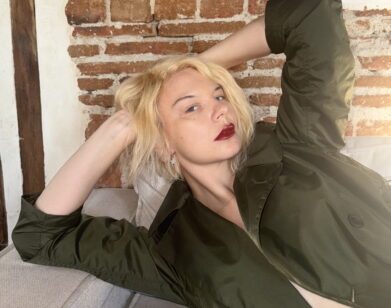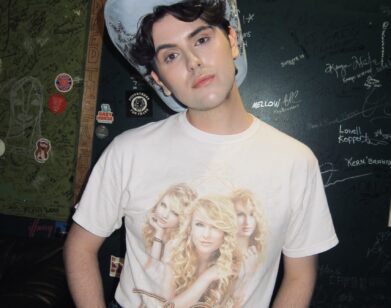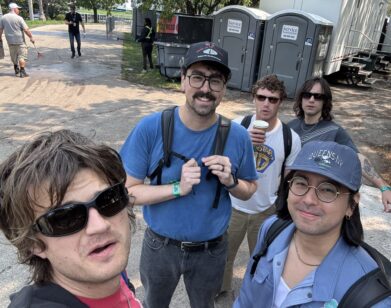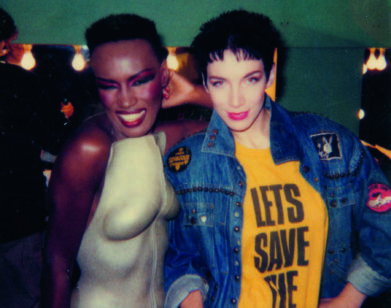Broken Social Scene, For Two Nights Only
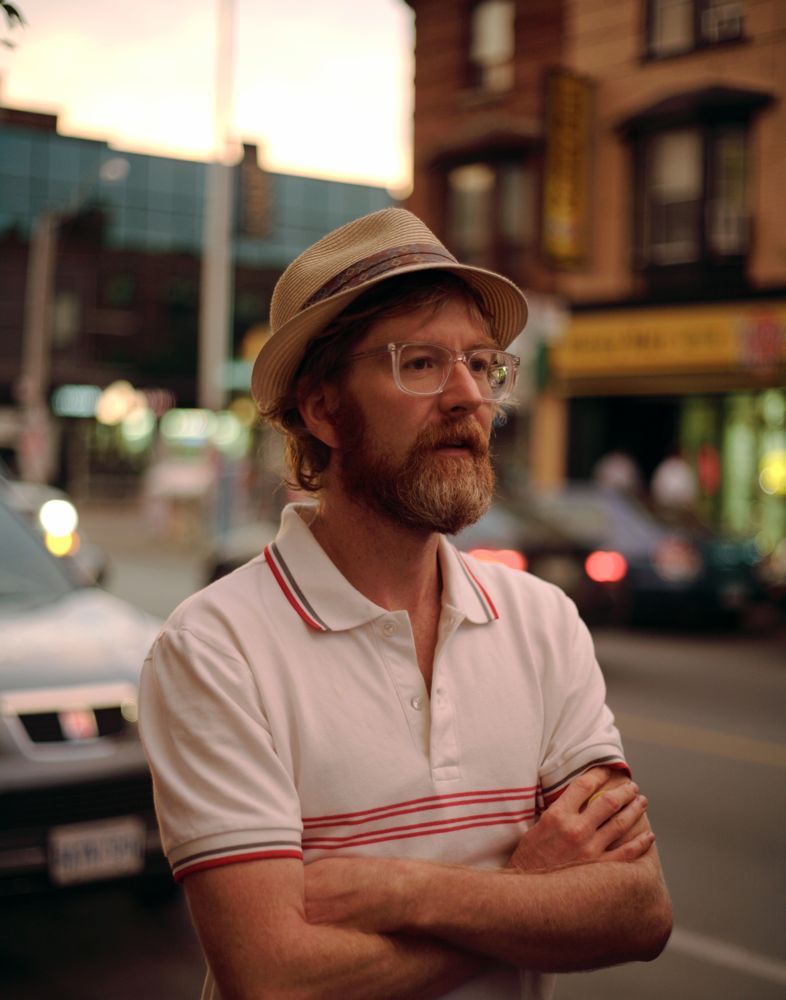
ABOVE: BRENDAN CANNING. PHOTO COURTESY OF NORMAN WONG
Canadian group Broken Social Scene—with its ever-fluctuating, but always impressive line-up—will reunite for two nights; tonight on Late Night With Jimmy Fallon in New York, and Saturday at the Arts & Crafts “Field Trip” festival in Toronto. Started by Brendan Canning and Kevin Drew at the turn of this century, the band has been on an official hiatus since November of 2011. This year, however, their label Arts & Crafts will turn 10, and such an anniversary deserves a celebration.
In anticipation of Broken Social Scene’s fleeting return, we spoke with Canning over the May Canadian holiday weekend.
EMMA BROWN: What are you doing for your holiday weekend?
BRENDAN CANNING: Oh, you know, filing away my records because they’re a mess. I’ve got a few DJ gigs coming up.
BROWN: Do you arrange them alphabetically or by genre?
CANNING: I do alphabetically by genre. Except for the ’80s section. The ’80s section is just kind of whatever. I started doing an ’80s night a few months ago and I only listen to them once a month.
BROWN: What’s one of your favorite records in your ’80s section?
CANNING: The The, Soul Mining (1983), I’m kind of liking lately—that’s a good one. Or Public Enemy, It Takes a Nation of Millions to Hold Us Back (1988), another good one. Both classic ’80s records. And, of course, Janet Jackson, Control (1986).
BROWN: So during your hiatus from Broken Social Scene you’ve been DJing. What else have you been doing? Have you taken up any exciting hobbies?
CANNING: I did a bunch of sketching, but it was only for a short spell. I released this album called Cookie Duster that I didn’t tour or anything. I didn’t do an amazing job at promoting it, to be quite honest but I also didn’t really want to be in a band, traveling and playing gigs. I also recorded the solo record too, that I’m releasing in the fall.
BROWN: Are you going to tour for that?
CANNING: Yeah, I think I’m going to have to do a little bit better job of getting the word out there. But it’s a real quiet kind of thing; there’s not any actual live drums on the record. It’s sort of acoustic guitar-driven. It’s something I’ve been wanting to do for a while. I did a score for a movie called The Canyons.
BROWN: How was that? From what I’ve read, it sounds like filming was a rather tempestuous process. Were you at all exposed to that or were you protected from it because you were just doing music?
CANNING: That was a fun ride. When Paul [Schrader], the director, came up here to sort of sign off on everything we definitely got a lot of gossip. Just the whole chain of command—it was hard to know exactly who was in the driver’s seat sometimes, I will say that. I think just the nature of how the film got made; everyone was kind of experimenting the whole way. We’re releasing the score and the soundtrack in August—well, it was supposed to be in August, but I haven’t got absolute confirmation on what’s going on with that, which is sort of indicative of the insanity of the film.
BROWN: Did you know what you were getting into when you agreed to do it?
CANNING: Yeah, I did, I did. So I can’t really complain too much. I did enjoy it. I’m really proud of the music that’s on there, and it’s a crazy little film. I’ve never had to score a threesome and a foursome scene in the same film so, that was new. Everyone’s gossiping about Lindsay Lohan, so all of a sudden you feel like, “I’m kind of in the midst of it.” It’s this funny, funny thing to be involved in.
BROWN: When you score a film, do they send you completed scenes and you put them to music or do they send you the script first?
CANNING: [Sometimes] they send the script and I give my pitch back of how I hear the music. But often that’s not the case; the film has been shot and they send you a rough cut with the temp music, as it were, “We’re looking for this sound here and this kind of vibe here.” They did [that] with The Canyons; when they started sending us clips, they had an idea of how they wanted it to go. I sort of heard their idea and I thought, “No, that’s not going to work and this is how I think it’s going to be,” and they kind of came around to my way of thinking. It’s kind of like Depeche Mode-y Western. I worked on it with the guys who I did my Broken Social Scene Brendan Canning record [Something for All of Us, 2008] with.
BROWN: In the spirit of Arts & Crafts 10th anniversary, I would like you to tell me what you were doing on this day in May when you were 10 years old.
CANNING: [laughs] I played soccer growing up as a kid, so there was the Memorial Day soccer tournament in Springfield, Virginia, but that was a week. What was I doing at age 10? Well I’d be in grade five. I’d be in Ms. Murray’s Portable Three class—we actually had a soccer team called the Portable Three Pythons.
BROWN: What’s a portable?
CANNING: Imagine there’s your school, but then there’s these little cottages and that’s where you’d be. When you go to homeroom, your homeroom is in the portable so you’re a little bit separate from the school, which I kind of enjoyed. There were three portables at my public school and we were the third one, I guess.
BROWN: What was your biggest concern at age 10?
CANNING: I was pretty into this girl named Sandy.
BROWN: Was it going well?
CANNING: No, not really. I think I should have gone for Susanne Green, because I think she might have been into me for a hot minute back then too, but kids are fickle. I was probably just playing a lot of soccer and listening to a lot of AM radio and in grade five I probably bought some XTC records or The Clash. I remember The Vapors, Turning Japanese was a big song. [starts singing] Turning Japanese I think I’m turning Japanese I really think so… do do do do do do do.
BROWN: That will be stuck in my head for the rest of my day now.
CANNING: An earworm. My mom was a high-school teacher, so we’d have some wayward students of hers come live with us. All my life growing up, there were always extra people in our house. I think maybe my folks might have got a little bit of money from the school to put up students, but yeah, we’d have this person or that person. You can kind of imagine what teenagers were looking like in 1978 or 1980.
BROWN: Were they fun? Were they like older siblings?
CANNING: Yeah, they were kind of like siblings—maybe a little rougher around the edges. [laughs] It was interesting though. It probably tipped off my fashion sense when I became more of a rocker type guy wearing the classic leather jacket with a lumber jacket underneath and a jean jacket vest over top of the leather jacket. I probably started dressing like that in high school. But that’s about all I can give you from age 10.
BROWN: Probably more than I can remember. How many Broken Social Scene members will be at the festival?
CANNING: Quite a lot. We’re going to perform the You Forgot It in People [2002] record from top to bottom. I don’t know if we announced that yet but whatever, I’m telling you now. So just some of the folks who played on that record; I would say there’d probably be at least 15, the usual kind of people coming in and out for this song or that song. How we normally run the big festival show.
BROWN: Is there a minimum number of people you have to have for it to be a Broken Social Scene performance?
CANNING: No, I don’t think so. I think we would suffice with a five-piece if we had to, and I think it would be a quality show. Maybe not as visually exciting for everyone, but at the same time it’s not supposed to be about the visual. I guess it is. It should be about the visual too, but I like the way the band sounds as a five-piece or a six-piece just as much as 15 people up on there.
BROWN: Did you mean for the band get so big or did it just evolve by itself?
CANNING: It just kind of happened. When Kevin [Drew] and I started it, it was just him and I in his basement. Prior to that, it was him and Charles [Spearin] doing their thing called K.C. Accidental, which is what led me to starting to work with Kevin. I didn’t even really know Charles in the beginning. Then there were just so many of our friends that were around. I had played in a band with Feist before, she was kind of coming from my crew. Someone like Bill Priddle, he was kind of coming from both our crews. Kevin knew James [Shaw] and Emily [Haines] from Metric, but then Emily was buddies with Feist too. It’s just this whole convergence. When we recorded Feel Good Lost (2001) it wasn’t: “Okay, now let’s all learn these songs!” Everyone had their own different bands and people would go off, so it was just more, “Hey, we want to play a show—who’s around?” It wasn’t so much a planned thing; it was just an inevitable thing.
BROWN: Are people ever like, “I feel so left out that you played a show and I was out of town!”
CANNING: I only missed one show. I think that night the band covered—what’s the lead-off track to Beck’s breakup record? I can tell you one second, actually. I just have to go to the “B” section. Pop music from 1990 and forward; it’s got its own section.
BROWN: Do you think festivals are important?
CANNING: It certainly is fun to go to a music festival and hear a bunch of bands and have that sort of rock camaraderie. I think it’s as important for the bands as much as it is to fans—you can catch up with your friends. It’s like a little reunion. We play Coachella and it’s like, “Hey, there are the guys from Here We Go Magic“ or “Hey, there are the guys from The National” or “Hey, there’s Kirsten Dunst.” I like Dunst, I like her acting, I like the films she’s been in.
BROWN: And how often do you see Kevin?
CANNING: These days? We were at a wedding on Saturday. That was a pretty fun wedding actually, this couple had a big party. This guy John and his boyfriend Ian—now his husband. Austra played as well, so that was cool. I was having dinner with a friend; there was no one in the restaurant but of course he walks in with his girlfriend like five minutes later. It’s one of those things where we’re somehow connected. Plus we’ve got lots to talk about these days as far as just getting the show together and we’re going down to play Jimmy Fallon too, so we’ve got to plan that. And Justin [Peroff], I see Justin often enough too.
BROKEN SOCIAL SCENE ARE PLAYING ON JIMMY FALLON TONIGHT, JUNE 6. THEY WILL ALSO PLAY AT THE FIELD TRIP MUSIC & ARTS FESTIVAL THIS WEEKEND IN TORONTO.

